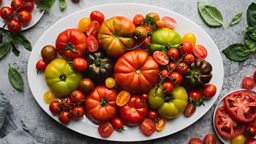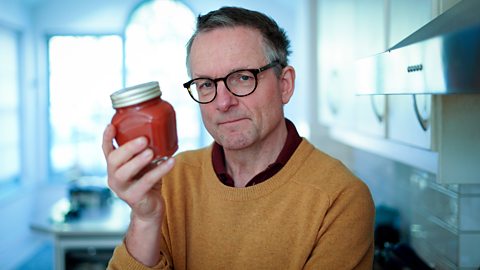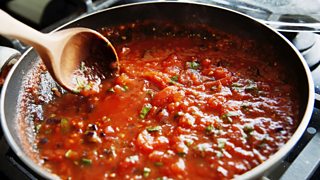Michael Mosley: Cook tomatoes to boost their health benefits
Tomatoes are packed with nutrients and their benefits are even greater when they are cooked, helping towards lower blood fat levels, quicker post-exercise recovery times, healthier skin and a reduced cancer risk.
In Just One Thing, Dr Michael Mosley finds out more about this special fruit and why it packs such a punch for health and vitality.

People were once wary of tomatoes
When tomatoes first came to Europe from the New World, people were suspicious of them thinking were poisonous. Of course, we know now that they are definitely not poisonous!
Drinking tomato juice has been shown to help muscle recovery after exercise.
They are one of the most popular fruits on the planet
As you may know, because of their seeds, tomatoes are not a vegetable but a fruit. In fact, they are one of the most popular fruits on the planet, owing this to their versatility and their beneficial nutrients such as vitamin C, potassium, folate and lycopene.
Tomato juice can help your heart and muscles
In a summary of six separate studies, it was found that drinking one to one-and-a-half cups of tomato juice a day for six weeks reduced levels of LDL (low-density lipoprotein) or “bad cholesterol” and raised levels of HDL (high-density liproprotein) or “good cholesterol”, meaning that the risk of cardiovascular diseases could potentially be reduced.
Drinking tomato juice has also been shown to help muscle recovery after exercise. A study by Greek scientists saw athletes either given an energy drink or tomato juice after strenuous exercise. Those who drank the tomato juice showed signs of quicker muscle recovery and reduced inflammation markers in their blood.
Cook tomatoes to get more of their benefits
Tomatoes contain a powerful antioxidant called lycopene that helps the body fight off “free radicals” – chemicals that attack and damage cells in the body. Lycopene is even more effective when tomatoes are cooked because the heat breaks down the fruit’s thick cell walls and makes the lycopene more accessible to the body. “That means tomato sauce from fresh or tinned tomatoes, and even ketchup can actually provide more lycopene than fresh tomatoes,” says Michael Mosley. If you are cooking tomatoes, add some olive oil and your body will absorb more of the lycopene.

Can tomatoes really help prevent cancer?
Professor Richard van Breemen explains.
Lycopene in tomatoes could help prevent prostate cancer
There have been a number of experiments measuring the effects of tomato sauce and paste on prostate cancer, which, in the Western world, is the second biggest cause of death among men. Prof Richard van Breemen from Oregon State University first noted the potential of lycopene after reading research by male physicians: those who ate the most lycopene in the form of tomato sauce, tomato paste and fresh tomatoes had the lowest incidence of prostate cancer.

In Prof van Breeman’s own experiments, a group of men at risk from prostate cancer ate pasta dishes with tomato sauce for three weeks. He saw lycopene levels in the blood and prostate increase and oxidative stress (damage to the cell and DNA that can lead to cancer) reduce.
“Lycopene can help prevent that initial DNA damage,” says Professor van Breemen, “reducing the load that the body has to bear and the repairs that have to be made.”
Research data also suggests that lycopene might benefit women with breast cancer.
Lycopene can promote healthier skin
It’s not just inside your body that lycopene can bring benefits – your skin could get a boost too. Studies where participants ate tomato paste with olive oil over a period of a few months gave some intriguing findings: one reported a 40% drop in sunburn, while another study showed raised levels of pro-collagen, the molecule that can make your skin look younger!
You cannot overdo lycopene
Hailed by Prof van Breeman as “a marvellous molecule”, lycopene is also “extremely safe” and not possible to overdo within a balanced diet. Based on his tests, the professor sets an optimum daily amount as 30mg. A tomato salad would only give you 5-10mg of lycopene, while 100g of cooked tomatoes in a sauce provides 50mg. As lycopene is a fat-soluble vitamin, adding in olive oil when you’re cooking tomatoes increases the amount you absorb.

















































